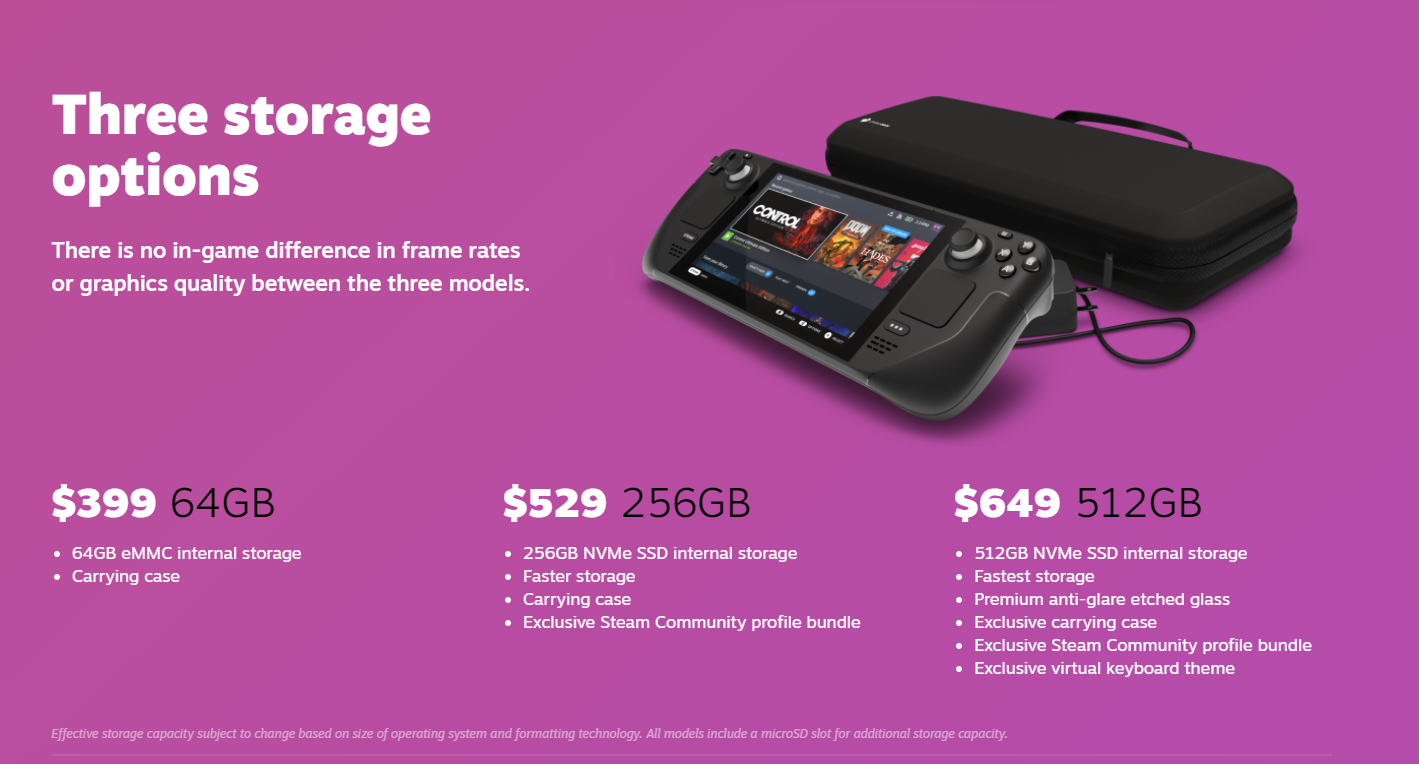Steam Deck announced and up for presale
Big news always drops after Co-op Mode releases and this story could have the potential to change PC gaming and how you play in the most affordable way yet.
Valve announced the Steam Deck on July 15th with Preorders starting July 16th and first shipments will start in December 2021.
But what is it and why do you care?
The Steam Deck is simply the first portable gaming PC backed by the number one PC gaming Marketplace owners, Valve. At $400 you get a Switch like handheld that offers the full Steam Library on the go. It has integrated game controls, a 7 inch screen and can play games at 720P from 2 - 8 hrs. This is a first for the PC market and opens PC gaming at a price point and form factor that has never been seen before.
While it runs Steam OS3 for a console like experience and UI, it’s also capable on running Windows and other software like any PC. So potentially you could also have the Epic gamestore, Amazon Prime gaming store and the PC gamepass app running on it as well to act as a portable xbox.
Valve knew a $400 price was key to make it affordable compared to gaming PC’s today
Pricing starts at $400 and doesn’t include a dock for TV output, but you can use any USB C adapter for adding additional ports, HDMI output or ethernet capabilities.
Currently the only upgrade options are faster internal storage and improved screen at the highest level.
A Valve produced dock is planned to be offered at a later date and no pricing has been released.
This video gives a great overview and answers some questions you might have.
But what’s the under the hood? I’m glad you asked, so here are the specifications per Steamdeck.com
Processor
AMD APU
CPU: Zen 2 4c/8t, 2.4-3.5GHz (up to 448 GFlops FP32)
GPU: 8 RDNA 2 CUs, 1.0-1.6GHz (up to 1.6 TFlops FP32)
APU power: 4-15W
RAM
16 GB LPDDR5 RAM (5500 MT/s)
Storage
64 GB eMMC (PCIe Gen 2 x1)
256 GB NVMe SSD (PCIe Gen 3 x4)
512 GB high-speed NVMe SSD (PCIe Gen 3 x4)
All models include high-speed microSD card slot
Controls and Input
Gamepad controls
A B X Y buttons
D-pad
L & R analog triggers
L & R bumpers
View & Menu buttons
4 x assignable grip buttons
Thumbsticks
2 x full-size analog sticks with capacitive touch
Haptics
HD haptics
Trackpads
2 x 32.5mm square trackpads with haptic feedback
55% better latency compared to Steam Controller
Pressure-sensitivity for configurable click strength
Gyro
6-Axis IMU
Display
Resolution
1280 x 800px (16:10 aspect ratio)
Type
Optically bonded LCD for enhanced readability
Display size
7" diagonal
Brightness
400 nits typical
Refresh rate
60Hz
Touch enabled
Yes
Sensors
Ambient light sensor
Connectivity
Bluetooth
Bluetooth 5.0 (support for controllers, accessories and audio)
Wi-Fi
Dual-band Wi-Fi radio, 2.4GHz and 5GHz, 2 x 2 MIMO, IEEE 802.11a/b/g/n/ac
Audio
Channels
Stereo with embedded DSP for an immersive listening experience
Microphones
Dual microphone array
Headphone / mic jack
3.5mm stereo headphone / headset jack
Digital
Multichannel audio via DisplayPort over USB-C, standard USB-C, or Bluetooth 5.0
Power
Input
45W USB Type-C PD3.0 power supply
Battery
40Whr battery. 2 - 8 hours of gameplay
Expansion
microSD
UHS-I supports SD, SDXC and SDHC
External connectivity for
controllers & displays
USB-C with DisplayPort 1.4 Alt-mode support; up to 8K @60Hz or 4K @120Hz, USB 3.2 Gen 2
Size and Weight
Size
298mm x 117mm x 49mm
Weight
Approx. 669 grams
Software
Operating System
SteamOS 3.0 (Arch-based)
Desktop
KDE Plasma
So will this change PC gaming and create a worthy addition to the portable gaming market?
Only time will tell, but Valve has brought innovation to VR with the Index headset and rules the PC gaming space.
So if anyone can take PC gaming in a new direction, trust Gabe Newell and maybe this could be how we finally get to play Half Life 2 Episode 3.

